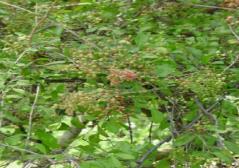
Lawsonia inermis / الحنة
COMMON NAME
Henna
LOCAL NAME
Henna, Alcanna, Mignontte tree, Egyptian Privet
Background
- Henna is a glabrous branched shrub up to 7 m height of the Lythraceae Family
- Indigenous to Arabia, Iran, Asia, North Africa and Egypt
- Naturalized in UAE through cultivation
Part(s) Used
Leaves, flowers, seeds& roots
Traditional and Medicinal Uses
Henna is derived from the Arabic name Alkenna. Henna was and still commonly used all over the world for dying hair and body. Henna has been used as/for
|
Antifungal |
Antimicrobial |
Hair and body dye |
|
Skin diseases |
Bruises |
Atopic dermatitis |
|
Dandruff |
Scabies |
Hair care |
How Much Do We Know?
- Henna refers to the powdered leaves of the plant Lawsonia inermis
- Henna is a common ingredient in many hair care products
- Henna is approved for topical use as a color additive in hair cosmetics in the US
What Do We Know About Safety?
- Henna is likely safe on topical use
- Henna is likely unsafe if taken orally
Using Henna by
Topical
Henna is applied topically to hair and skin
Special Precautions & Warnings
Pregnancy& Breast-feeding
Unsafe when used orally as it may induce abortion. avoid use.
Keep in Mind
- Do not hesitate to speak with your health care provider before starting to use any supplements.
- Discuss potential benefits and risks, especially if you are suffering from any health problems.
